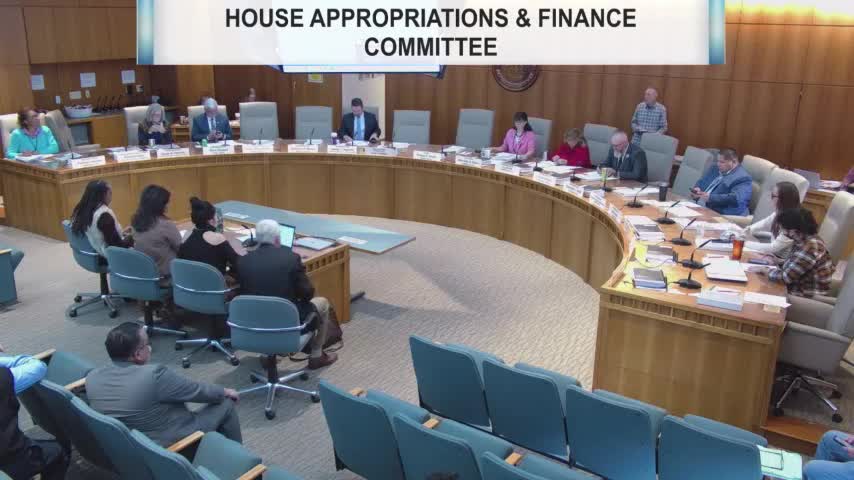Committee advances bill to change civil statute of limitations for childhood sexual assault
Get AI-powered insights, summaries, and transcripts
Subscribe
Summary
The House Appropriations and Finance Committee adopted a committee substitute for House Bill 73 and recommended the substitute for passage, moving a measure that would expand civil filing opportunities for adult survivors of childhood sexual assault forward with a 15–1 vote.
The House Appropriations and Finance Committee on an unspecified date adopted a committee substitute for House Bill 73 and voted 15–1 to recommend the bill on the committee substitute, advancing the measure to the next stage.
The substitute would change the civil statute of limitations for claims arising from childhood sexual assault and includes a temporary three‑year look‑back window to allow older survivors to file claims that otherwise would be time‑barred. Sponsor Representative Anaya and survivor and expert witnesses told the committee the substitute is narrowly written to exclude governmental entities covered by the Tort Claims Act and the New Mexico Civil Rights Act.
Representative Anaya, the bill sponsor, explained the substitute and said it ‘‘expands the statute of limitations, so a survivor of childhood sexual assault can come forward’’ and described a three‑year look‑back window during which older claims could be filed. The substitute number discussed in committee was 231485.2; committee members adopted that committee substitute without recorded objection at the outset of debate.
Survivor Lex Garcia testified in person about personal harm and the motivation for the bill. ‘‘I come to you today as a survivor of child sexual abuse. For two years and almost a daily cadence, my teacher raped me,’’ Garcia said, adding that she reported the abuse to school and law‑enforcement authorities at the time but was prevented from seeking civil redress by existing time limits.
Law enforcement and provider groups told the committee they support expanded civil remedies. Larry Sontag, a retired Albuquerque Police Department supervisor representing Better Together New Mexico Advocacy Network, said investigators see the lasting harm that prosecutions and civil suits can address. Marty Esquivel, general counsel for the New Mexico Public School Insurance Authority, told members that negotiators and the sponsor had worked to remove ambiguous language and that the revised fiscal impact report (FIR) tied to the committee substitute showed no fiscal impact to state agencies.
Committee members focused significant attention on three topics: (1) the age cap and timing of potential claims; (2) the bill’s scope with respect to public‑entity liability and insurance; and (3) how civil recovery would operate where a wrongdoer is dead or judgment‑proof.
On the age cap, committee discussion included varying references. The sponsor described the substitute as expanding the civil statute of limitations and repeatedly referenced the three‑year look‑back period for older claims. Committee members and witnesses also discussed data about average disclosure age (a witness cited an average disclosure age of 52) and several members asked about a cap expressed elsewhere in the hearing (committee members referenced the figure 58 during questioning). The committee did not record a single definitive age cap in the hearing transcript; the substitute text (231485.2) was the operative language adopted by the committee.
On public‑entity exposure and insurance, Representative Anaya and the bill’s expert witnesses repeatedly said the substitute was drafted so it would not open claims against governmental entities that are covered by the New Mexico Tort Claims Act or the New Mexico Civil Rights Act. Witnesses explained that those statutes, and current tort‑claims law, limit when a government or public employer can be sued (generally only when the employee was acting within the scope of employment). The committee also heard concerns about private insurance: members asked whether insurers would continue to write coverage for schools and nonprofits if the civil window were extended decades into the future. An expert witness said common liability policies exclude criminal acts and molestation and that other states with expanded time frames have generally continued to have insurance markets; the committee recorded requests for additional comparative insurance data.
Members asked practical questions about relief when a wrongdoer is deceased or insolvent. Experts said a civil cause of action survives the wrongdoer in some circumstances, but recovery depends on available assets; family‑law and estate questions (for example, whether community property could be reached) were noted as complex and flagged for follow‑up before floor action.
After public testimony and committee questions, Vice Chair Dixon moved a combined recommendation: a ‘‘do not pass’’ on the earlier House Judiciary committee substitute and a ‘‘do pass’’ on the House Appropriations and Finance Committee substitute. The committee took a roll‑call vote and the motion carried 15–1. Representative Vincent recorded a ‘‘no’’ vote with an explanation; the clerk announced 15 affirmative and 1 negative vote in favor of a do‑pass recommendation on the HAFC substitute.
The committee recorded commitments to provide clarifying materials before floor consideration, including (1) the revised fiscal impact report showing no agency fiscal effect tied to the substitute, (2) clarification from family‑law experts on estate/community‑property questions raised in member colloquy, and (3) further insurance‑market comparisons from other states that have amended civil time limits for childhood sexual‑abuse claims. The committee chair said members would revisit remaining items and would continue working with sponsors off the floor.
Votes at a glance: The committee adopted committee substitute 231485.2 without recorded objection during the hearing and later voted 15–1 to recommend a do‑pass on the House Appropriations and Finance Committee substitute.
The committee advanced the measure; the next procedural steps are committee paperwork and placement on the House calendar for floor consideration.
